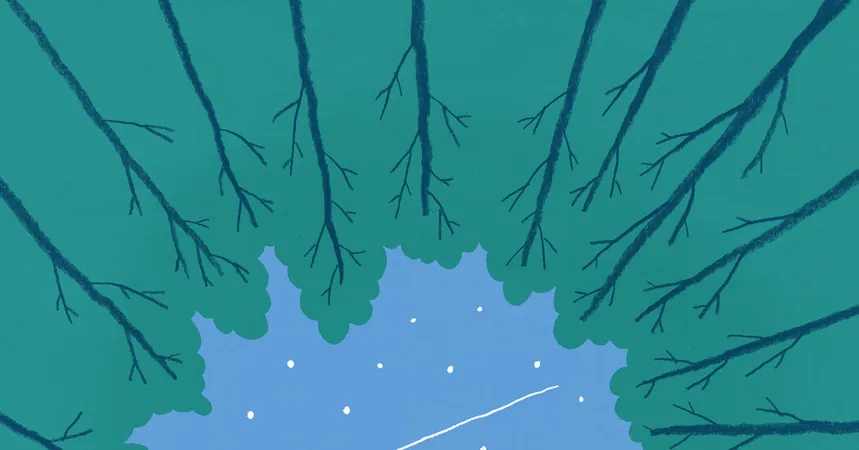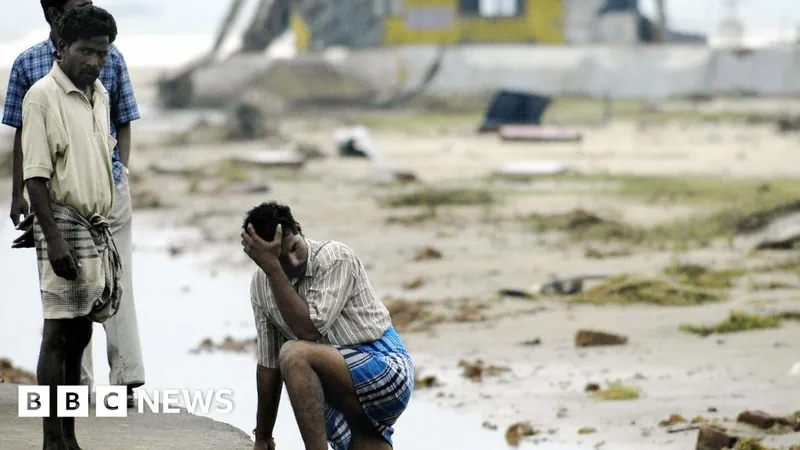
Grief: The Unseen Force That Transports Us Through Time
2024-12-21
Author: Wai
As I lounged in my pajamas, engrossed in a Netflix documentary on space telescopes, memories of my mother began to invade my thoughts. “The iron in our blood and the calcium in our bones was formed from a star that exploded billions of years ago,” the enthusiastic astrophysicist declared. An image of the Southern Ring Nebula flashed across the screen, resembling an eye, a womb, a portal opening in the cosmic expanse. I became transfixed, pondering how this dying star was somehow connected to my own existence and by extension, to my mother.
A few years earlier, while I was in New York’s Hell’s Kitchen with friends, I received overwhelming news about my mother’s health. A respected political scientist and litigator, she had suddenly suffered a stroke, waking in fear and unable to communicate. In January 2016, I learned the full extent of the damage via brain scans sent to me just before I boarded a flight to Tehran.
My friend James, a fellow neuroscientist, gave me an understanding look when I revealed the scans. We had spent years studying neuroscience, but this was different. “The stroke is swallowing her brain,” I told him, showing him the ominous dark spot on the scan—an unstoppable black hole encroaching on my mother’s light.
Desperate to connect with her, I texted my father and sister: “Touch her limbs and name them. Record your voices. Play it for her; maybe something will resonate within her.” My mother, once vibrant and full of life at 62, was caught in a paralyzing limbo, and the grip of disbelief complicated our suffering. Sleep became elusive, joy utterly foreign; I turned to smoking, perhaps in a futile attempt to gain a sense of control amidst the chaos.
During those harrowing days, time itself fractured. Memories of our conversations flooded back, and I fluctuated between hopeful futures where she recovered and bleak realities where I never heard her voice again. Each moment existed simultaneously—pasts where she nurtured me, futures where I could pour love into her care or, heartbreakingly, future scenarios where she would be no more.
My understanding of time had changed. Before this grief, I viewed it as a straight path, research-founded and measurable. But the sorrow I experienced refracted time into myriad points, similar to the stars we observe that live within a complex, vibrating web of possibilities.
In the hospital waiting room with relatives, I displayed my mother's brain scans on my iPad, trying to convey the gravity of our situation. The divide between faith and science felt insurmountable when my aunt retorted, “You have your science, and we have our prayers.” Frustration bubbled inside me as I yelled, “I’m losing my mom! Praying won’t change that.” Ironically, it was my scientific knowledge that rendered me paralyzed with helplessness, while those around me clung to hope.
Meanwhile, my father dedicated himself to her care. Rising at dawn, he donned a suit and held her hand as if guiding her spirit back from the abyss. He treated her coma as a mystical journey—one where he could bring her back through stories and memories. It was a profound expression of love, one that made me question my own emotional responses. Why couldn’t I commit to faith as he had? Was there a chance my mother could sense our devotion in the silence of her mind?
These reflections led me to reconsider my upbringing in a culture rich with scientific advancement yet equally steeped in poetic mysticism. I grew up learning about Persian scholars such as Avicenna and al-Khwarizmi, and I admired how they embraced the unknown. The ancient wisdom that acknowledged the limits of reason illuminated my journey of grief.
Ultimately, the grief proved transformative. My surroundings began to feel more laden with the absence of my mother—each nook in our home resonated with her touch. Fleeing the suffocating reminders of her absence, I sought refuge in the homes of artists, allowing the vibrational energy of creativity to shift my perspective. Grief reshaped my identity as I explored connections to my roots and community, and in doing so, I found a sense of hope.
Sadly, 43 days after her stroke, my mother passed away. We buried her in the north and honored her memory by planting a tree above her grave. In my sorrow, I found myself immersed in the forests near the Caspian Sea, where I felt the pulse of life all around me. In that wilderness, I discovered profound peace, the sensation of being enveloped by the lineage of those who came before me.
Several months later, with a visa in hand, I returned to Princeton. The scientist who walked into that space was no longer the same; I had become one who listened to trees and found comfort in the repeated melodies of Philip Glass.
Since her passing, I’ve felt a closer connection to my mother, freed from the emotional baggage of our past. I dream of her often, sharing exchanges of love and reassurance. “Do you believe she’s at peace?” my father asked me one day, and I could only affirm that she was. The wonders of life and death intertwined, culminating in the realization that grief is not a linear process; it’s a spectrum—a time machine that reshapes our narratives and awakens deep reflections within us.
As I revisited the documentary, I once again focused on the Pillars of Creation. “We are made from the same material,” the astrophysicist noted, echoing the resounding truth of our interconnectedness. Grief isn’t merely an endpoint; it is a catalyst for transformation, igniting us to explore new beginnings, to weave new stories from the threads of love, loss, and hope.
And so, I ponder: Is this where my journey truly begins?





 Brasil (PT)
Brasil (PT)
 Canada (EN)
Canada (EN)
 Chile (ES)
Chile (ES)
 España (ES)
España (ES)
 France (FR)
France (FR)
 Hong Kong (EN)
Hong Kong (EN)
 Italia (IT)
Italia (IT)
 日本 (JA)
日本 (JA)
 Magyarország (HU)
Magyarország (HU)
 Norge (NO)
Norge (NO)
 Polska (PL)
Polska (PL)
 Schweiz (DE)
Schweiz (DE)
 Singapore (EN)
Singapore (EN)
 Sverige (SV)
Sverige (SV)
 Suomi (FI)
Suomi (FI)
 Türkiye (TR)
Türkiye (TR)